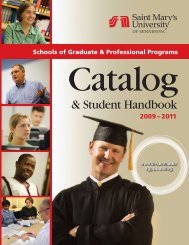PDF version - Saint Mary's University of Minnesota
PDF version - Saint Mary's University of Minnesota
PDF version - Saint Mary's University of Minnesota
Create successful ePaper yourself
Turn your PDF publications into a flip-book with our unique Google optimized e-Paper software.
Computer Science<br />
techniques and their analysis are also covered. Class lab time is used to reinforce concepts and practices<br />
covered in lectures. Offered fall semester. Prerequisite: grade <strong>of</strong> C or better in CS110/111.<br />
CS220 Discrete Mathematics 3 credits<br />
This course provides the theoretical foundation <strong>of</strong> modern computer hardware and s<strong>of</strong>tware. It provides that<br />
foundation in the form <strong>of</strong> mathematical tools and concepts geared toward computer science applications.<br />
Topics covered include: logic and set theory; functions and relations; simple algorithm analysis; and an<br />
introduction to graph theory. Offered fall semester. Prerequisite: mathematics competency.<br />
CS288 Programming the Mobile Device I 3 credits<br />
This course exposes students to s<strong>of</strong>tware development on a mobile platform. Topics include performance<br />
and usability issues on hand-held devices, application portability, tools for mobile development and web<br />
protocols for mobile programming. After covering the basics <strong>of</strong> mobile development, the student will<br />
build their own mobile application. Prerequisite: grade <strong>of</strong> C or better in CS210<br />
CS290-299 Special Topics: Programming Languages & Environments<br />
1-3 credits<br />
Designed to permit the exploration <strong>of</strong> various languages not used in earlier courses (e.g., JavaScript, XML,<br />
C/C++, Perl) as well as to introduce the students to various programming environments and other CS<br />
applications (e.g. debugging tools, LaTeX, UNIX). Course <strong>of</strong>ferings are driven by student and faculty interest.<br />
CS301 Computers and Society 3 credits<br />
This course covers a wide array <strong>of</strong> current topics related to social, legal, and ethical issues arising from<br />
the pervasive use <strong>of</strong> current and emerging computer-related technologies. Through discussion and<br />
writing, students are expected to thoughtfully explore the covered topics. This course is part <strong>of</strong> the<br />
College’s Intensive Writing Program and satisfies the upper-level writing requirements for computer<br />
science majors. Offered fall semester. Prerequisite: E120 or equivalent.<br />
CS325 Computer Science III S<strong>of</strong>tware Design and Testing 4 credits<br />
This third course in the three semester programming sequence emphasizes the principle and practices<br />
<strong>of</strong> s<strong>of</strong>tware design and testing which result in quality s<strong>of</strong>tware. Object-oriented design is covered<br />
in conjunction with refactoring, unit testing and continuous integration. This class highlights the<br />
connection between s<strong>of</strong>tware design and s<strong>of</strong>tware reliability. Class lab time is used to introduce new<br />
concepts and explore ones described during lecture. Offered spring semester. Prerequisites: grade <strong>of</strong> C<br />
or better in CS210 and CS220 and concurrently with CS325.<br />
CS355 Database Management Systems 3 credits<br />
A study <strong>of</strong> fundamental database management systems. Course topics include: data modeling, database<br />
design and structured query language (SQL), transaction management, data integrity and security.<br />
Object-relational mapping techniques and technologies will also be covered. Offered spring semester.<br />
Co-requisite: CS325.<br />
CS356 Introduction to Scientific Computing 3 credits<br />
A course designed to provide undergraduates students with the basic computational tools and<br />
techniques needed for their study in science and mathematics. Students learn by doing projects that<br />
solve problems in physical sciences and mathematics using symbolic and compiled languages with<br />
visualization. By use <strong>of</strong> the Sage problem-solving environment and the Python programming language,<br />
the students learn programming and numerical analysis in parallel with scientific problem solving. Also<br />
<strong>of</strong>fered as M356 and P356. Prerequisites: CS106, M251, M252, and ST232.<br />
CS380 Web Systems Analysis, Design, and Implementation 3 credits<br />
This course introduces students to the design and implementation <strong>of</strong> web applications. Using n-tier<br />
architectures as a starting point, students learn the concepts and practices involved in the development<br />
<strong>of</strong> dynamic and stateful web applications integrated with a database system. Both server-side and<br />
86
















